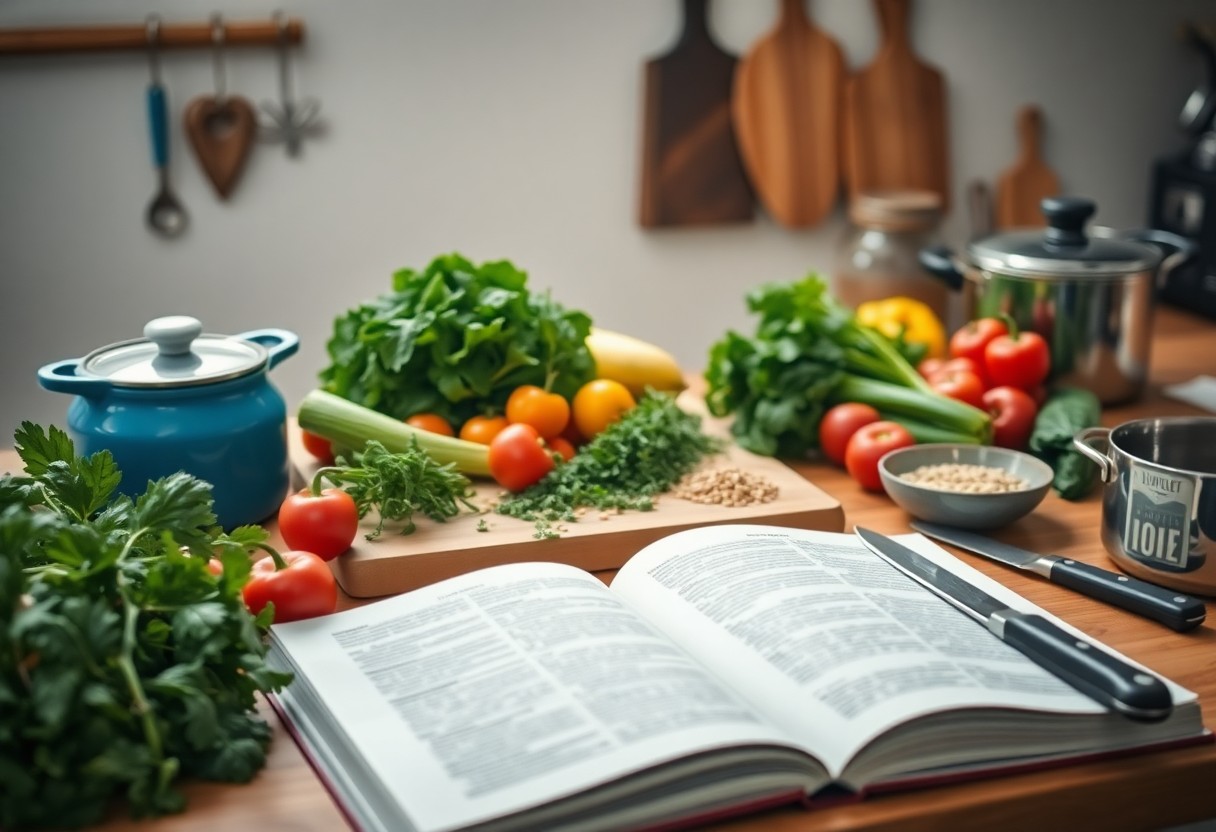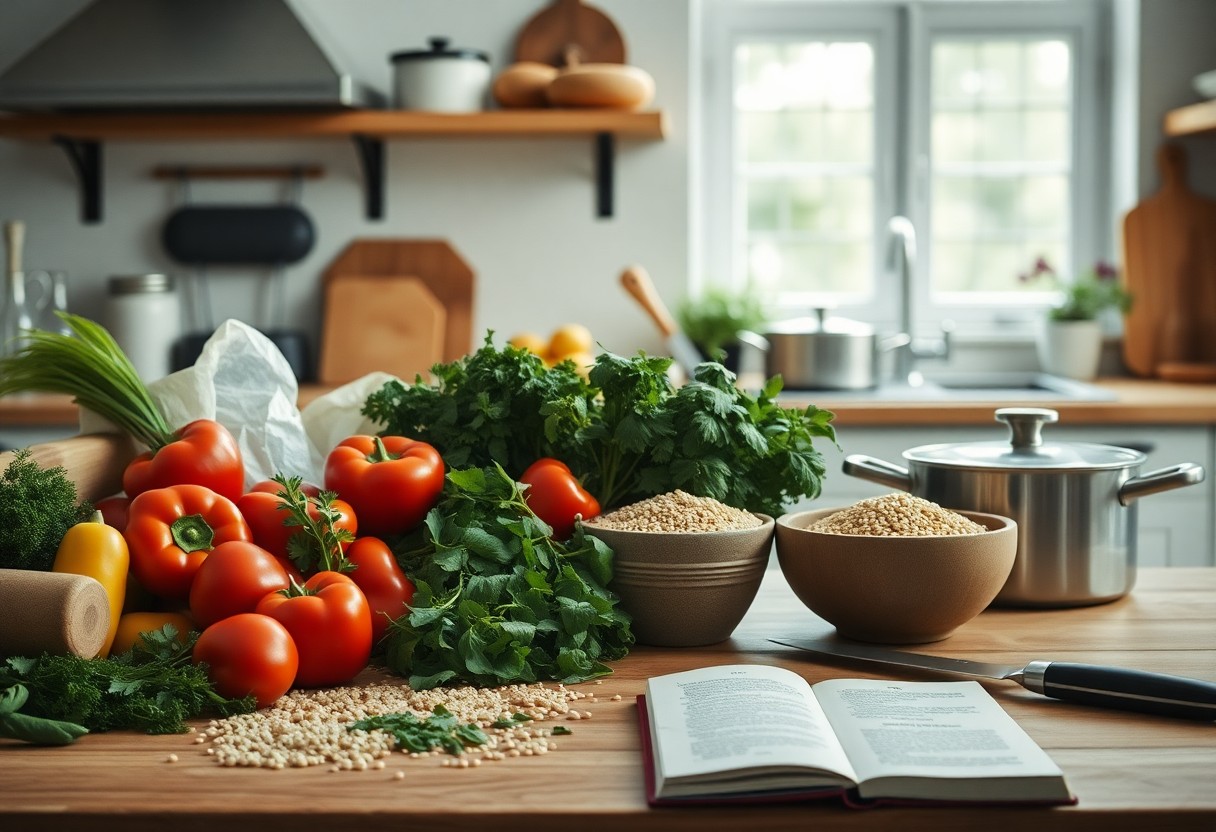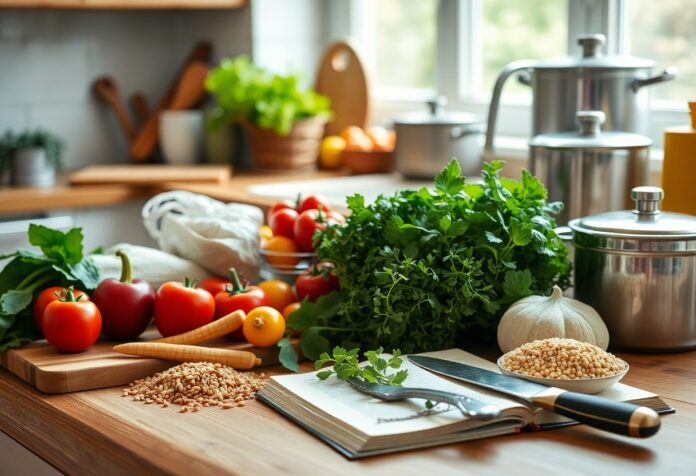Tips for cooking wholesome meals can transform your kitchen experience from daunting to delightful. By focusing on fresh ingredients, you enhance not just the flavor but also the nutritional value of your meals. Emphasizing healthy cooking methods like steaming and baking over frying can significantly reduce unhealthy fats. With simple techniques and smart choices, you’ll find that preparing meals can be easy and enjoyable. These tips will help you develop confidence in your cooking skills while ensuring that your meals nourish both your body and your taste buds.
Essential Cooking Tools for Beginners
Your journey into cooking can be significantly enhanced by having the right tools at your disposal. When you invest in some important kitchen gadgets, you set yourself up for success in preparing delicious, wholesome meals. A few must-have items include a sharp chef’s knife, cutting board, measuring cups and spoons, and a sturdy skillet. These simple yet effective tools can help you chop, measure, and cook with confidence, ensuring that you can follow recipes accurately and efficiently.
Must-Have Kitchen Gadgets
Behind every great home-cooked meal is a selection of reliable kitchen gadgets. You don’t need to fill your kitchen with fancy appliances to create tasty dishes. Instead, focus on versatile tools like a pair of tongs, a vegetable peeler, and a mixing bowl. Each of these tools serves multiple purposes, making meal prep smoother and easier. Investing in high-quality versions of these gadgets will ensure they last for years, allowing you to hone your culinary skills as you explore new recipes.
Preparing Your Workspace
Your cooking experience greatly improves when you take the time to prepare your workspace. A well-organized kitchen can enhance your efficiency and boost your creativity while cooking. Start by clearing off your counters and ensuring all your ingredients and tools are within arms reach. This not only reduces distractions but also minimizes the risk of accidents, such as spills or cuts, that could arise when you’re fumbling around mid-recipe.
With an organized workspace, you’ll find that meal preparation becomes more enjoyable. Take a moment to gather all ingredients and tools before you begin cooking. Place items you’ll need on the countertop, ensuring you have adequate space for chopping, mixing, and plating. Keep frequently used items easily accessible while stashing away less important gadgets and ingredients to keep your workspace-clutter free. Cultivating a clean and orderly environment positively impacts your cooking experience, allowing you to focus on crafting wholesome meals with ease.

Understanding Ingredients
You may not realize it, but the ingredients you choose can make a significant difference in the taste and healthiness of your meals. Selecting the best produce is vital, as fresh ingredients not only enhance the flavor of your dishes but also add a variety of nutrients. When shopping for fresh produce, pay attention to color, appearance, and smell. Vibrant colors can indicate ripeness and nutrient density, while dull or discolored fruits and vegetables may signal that they are past their prime. Try shopping at local farmers’ markets or grocery stores that prioritize fresh, in-season produce to ensure you’re getting the best quality.
Choosing Fresh Produce
To determine which fruits and vegetables are actually fresh, inspect them closely. Look for firmness in vegetables and fruits without blemishes, soft spots, or shriveling skin. When possible, choose organic options as they often contain fewer pesticides and are better for your health and the environment. Additionally, opt for seasonal products as they tend to be more flavorful and affordable, making your meals both delightful and budget-friendly.
Balancing Flavors and Textures
Understanding the balance of flavors and textures in your meals can elevate your cooking skills significantly. Combining sour, sweet, salty, and bitter components can create harmonious dishes that excite your taste buds. For example, a squeeze of lemon (sour) can brighten the richness of a creamy pasta dish, while a sprinkle of salt can enhance the sweetness of roasted vegetables. You should also consider the textures of the ingredients—mixing crunchy, creamy, and chewy elements can make for a more satisfying eating experience.
The key to mastering flavors and textures lies in knowing how to enhance the natural qualities of your ingredients. You can achieve this by using seasoning wisely and incorporating elements like sauces, dressings, or herbs that complement your dishes. Don’t be afraid to experiment with different combinations to discover what works for you, and always taste as you cook to ensure your dish is just how you like it. Balance is not just about using the right ingredients—it’s about creating a meal that feels complete and satisfying.

Basic Cooking Techniques
There’s a world of flavors waiting for you to explore through basic cooking techniques. Mastering these methods will not only enhance your culinary skills but also empower you to prepare wholesome meals that nourish your body and delight your palate. Understanding various cooking styles, from steaming to sautéing, will allow you to choose the best technique for the ingredients you have on hand, making it easier to whip up delicious dishes effortlessly.
Essential Cooking Methods
Cooking is an art and a science, and having a grasp of imperative techniques can elevate your dishes significantly. For instance, roasting vegetables caramelizes their natural sugars, enhancing their flavor, while boiling can help to retain nutrients in food when done correctly. Learning methods like grilling and braising can also introduce you to different flavors and textures, giving you endless options for creating wholesome meals.
Time-Saving Tips
The kitchen can become your best friend when you implement effective time-saving tips for meal preparation. By planning your meals for the week, you can dedicate a few hours to chop, marinate, and pre-cook ingredients, which vastly reduces the time spent cooking on busy nights. Additionally, investing in a few helpful kitchen gadgets like a slow cooker or an instant pot can revolutionize your cooking routine, allowing you to focus on other tasks while your meal cooks.
- Meal prepping not only helps save time but also reduces waste.
- Batch cooking allows you to prepare large quantities, saving you effort throughout the week.
- Utilizing frozen ingredients can significantly cut down on prep time without sacrificing flavor.
Recognizing where you can save time in the kitchen can lead to a more enjoyable cooking experience. If you focus on efficient techniques, your time spent in the kitchen becomes streamlined and less stressful.
At the end of the day, your goal is to create meals that you and your loved ones enjoy, while also being efficient in the kitchen. Here are some additional tips to help you make the most of your time:
- Use a shopping list to streamline your grocery store visits and save time.
- Engage in one-pot meals for easy cleanup and effortless cooking.
- Keep imperative ingredients on hand, so you’re always ready to whip up a meal.
Recognizing these strategies and incorporating them into your routine can vastly improve your cooking experience, making it less daunting and much more enjoyable.
Meal Planning and Preparation
Not all meals require elaborate cooking techniques or countless hours in the kitchen. By setting aside some time each week to plan and prepare, you can simplify your cooking process. Meal planning not only helps you stay organized, but it also promotes healthier eating habits by allowing you to think ahead and choose wholesome ingredients. Additionally, it reduces last-minute takeout orders, ensuring that you have nutritious options available whenever hunger strikes.
How to Create a Weekly Meal Plan
Beside being an overwhelming task, creating a weekly meal plan can actually be quite enjoyable. Start by choosing a day of the week when you can dedicate some time to planning. Consider your schedule for the week ahead and reflect on any days you know you’ll be particularly busy. From there, choose simple recipes that can either be repeated or modified throughout the week. Make sure to incorporate a variety of fruits, vegetables, proteins, and whole grains to ensure a balanced diet.
Also, block off time during your week to prep ingredients, such as chopping vegetables or marinating proteins, which can save you time during cooking. As your skills increase, feel free to experiment! Plan dishes that utilize similar ingredients, allowing you to reduce waste and make the most of what you have.
Batch Cooking and Leftovers
Against the common myth that batch cooking is just for meal preppers, know that it’s an excellent technique for anyone looking to save time and create wholesome meals. Cooking in larger quantities allows you to dedicate one day for more cooking, which in turn gives you ready-to-eat meals for the rest of the week. Aim to prepare a few staples that can be easily refrigerated or frozen, such as stews, grain salads, or roasted vegetables. This not only makes meals effortless, but it also reduces the temptation to reach for unhealthy snacks.
A well-thought-out approach to batch cooking can be a game changer for your weeknight meals. By making double the portion of your favorite recipes, you’ll have leftovers that can be enjoyed for lunch or dinner, minimizing food waste and saving you money. When storing your leftovers, consider using clear containers, as they help you see what you have on hand and make it easier to grab a healthy option when you’re in a rush. Consider freezing items that you won’t eat within a few days, and always label your containers with the date to keep track of freshness.
Making Wholesome Choices
Many people find the journey to healthier eating daunting, but making wholesome choices can be simplified with a few strategies. It all begins with understanding what constitutes a balanced meal, which includes incorporating nutrient-dense foods that provide crucial vitamins and minerals. When you prioritize whole foods like fruits, vegetables, whole grains, lean proteins, and healthy fats, you’re not only enhancing the nutritional value of your meals but also fostering a connection to your food that can transform the way you eat and how you feel.
Nutrient-Dense Ingredients
Above all, focusing on nutrient-dense ingredients can elevate your meals without complicating the cooking process. Foods like leafy greens, berries, nuts, and legumes pack an impressive array of nutrients relative to their calorie content. By choosing these ingredients, you allow yourself to enjoy generous portions while still working towards your health goals. As you explore these foods, you’ll begin to appreciate their flavors and textures, bringing a wholesome quality to your cooking that goes beyond mere sustenance.
Substituting for Healthier Options
Beside incorporating nutrient-dense ingredients, you can enhance your meals by substituting for healthier options. This might mean swapping out refined grains for whole grains or choosing yogurt instead of sour cream. These small changes can significantly impact your overall health without sacrificing the taste or texture of your favorite dishes. As you try these substitutions, you may discover that your meals become richer in flavor and nutrition, making every bite both satisfying and beneficial for your body.
The beauty of substituting for healthier options lies in the flexibility it affords you. For instance, opting for a pureed avocado in place of mayonnaise adds a creamy texture while providing healthy fats. Likewise, using mashed bananas or unsweetened applesauce can replace sugar in baking, resulting in a naturally sweet and moist product. Such alternatives not only reduce the intake of processed ingredients but also enhance the nutritional profile of your meals, allowing you to enjoy food that tastes good and supports your health goals.
Cooking with Confidence
Unlike many misconceptions about cooking, it’s not reserved for the culinary elite or seasoned professionals. Embracing cooking as an enjoyable experience can be transformative, allowing you to create wholesome meals for yourself and your loved ones. When you approach cooking with a sense of confidence, you’ll find that it becomes less about perfection and more about creativity and nourishment. This shift in mindset is fundamental to making cooking a more pleasurable and less intimidating activity in your daily routine.
Overcoming Common Fears
Fears often stand in the way of your journey to becoming a confident cook. Whether it’s the anxiety of using unfamiliar ingredients, the fear of making a mess, or the worry that a dish might not turn out as expected, these concerns can be overwhelming. It’s imperative to recognize that making mistakes is part of the learning process. Each time you cook, you gain valuable experience that can turn these fears into strength. Start with simple recipes and gradually challenge yourself as your skills and confidence grow.
Experimenting with Recipes
On your culinary journey, don’t shy away from tweaking recipes to suit your taste. Cooking is an art that thrives on innovation, and by making small changes, you can personalize a dish and make it truly yours. Consider swapping ingredients, altering cooking times, or adding spices to boost flavor. This exploration allows your palate to develop and can lead to delightful discoveries. When you experiment, you cultivate a deeper connection with your food and elevate your cooking skills.
Plus, experimenting with recipes fosters a sense of adventure in the kitchen. As you combine various ingredients or try new techniques, you’ll find that your confidence in cooking will flourish. It’s not just about the end product – the process becomes a rewarding journey. Don’t be afraid to embrace bold flavors or unusual combinations; the kitchen is your playground, and these experiments can lead to delightful surprises. Embrace the idea that even if a dish doesn’t turn out perfectly, you’ve gained valuable experience and knowledge that will enhance your cooking for the next time.
To Wrap Up
Hence, taking the time to embrace beginner-friendly cooking tips empowers you to create wholesome meals that not only nourish your body but also delight your palate. By incorporating simple techniques such as meal prepping, ingredient substitution, and utilizing seasonal produce, you can enhance your culinary skills while enjoying the entire cooking experience. A little planning can go a long way in making healthy cooking easier and more enjoyable, allowing you to explore various flavors and cuisines without feeling overwhelmed.
Moreover, as you gain confidence in the kitchen, you will discover your unique cooking style, helping you to curate meals that reflect your preferences and dietary needs. Prioritize learning and experimenting with recipes that resonate with you, and don’t hesitate to ask for guidance or inspiration from others. This is a journey, and each wholesome meal you prepare brings you one step closer to mastering the art of cooking in a way that feels both satisfying and enriching.


